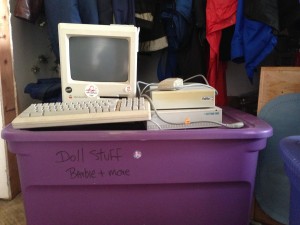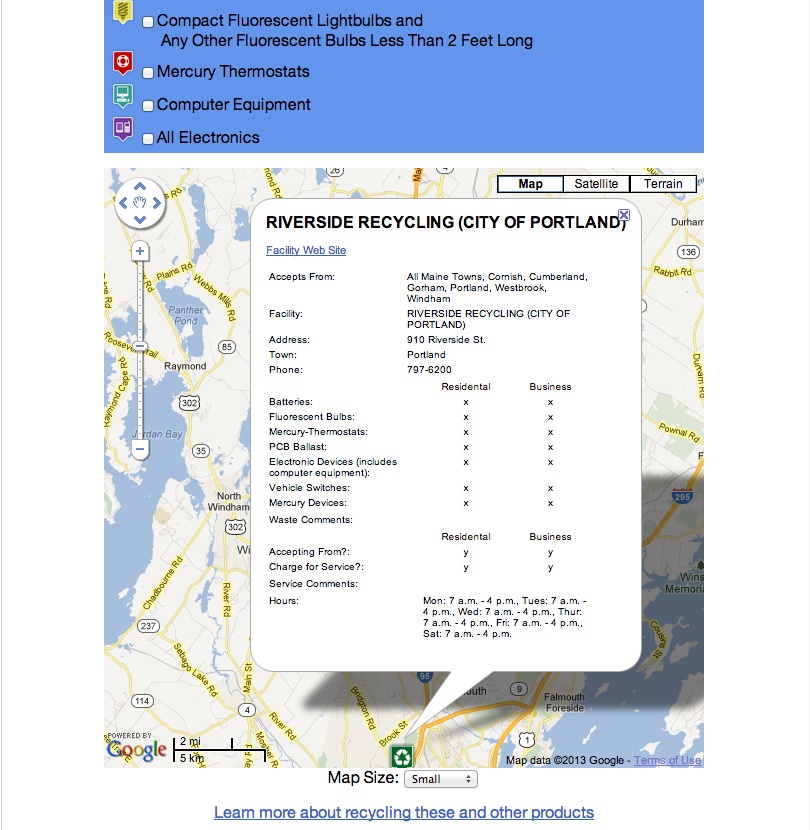 The Atwood family has a hard time getting rid of stuff. We still have our first computer — an iMac Plus. Yes, we are loyal Apple fans. We took our daughters to DC during April vacation back in the 90s and our computer was already on display in the Smithsonian. By then we’d moved up to a newer version. We still have them both. We also still have the computers we bought the girls when they were in high school — they’ve long since graduated from college. We have them all, mostly because we didn’t know what to do with them. We just put them away with all the other things we’ve accumulated over the years. (Did you notice that container of doll stuff under the computer? It’s full!) Out of sight, out of mind.
The Atwood family has a hard time getting rid of stuff. We still have our first computer — an iMac Plus. Yes, we are loyal Apple fans. We took our daughters to DC during April vacation back in the 90s and our computer was already on display in the Smithsonian. By then we’d moved up to a newer version. We still have them both. We also still have the computers we bought the girls when they were in high school — they’ve long since graduated from college. We have them all, mostly because we didn’t know what to do with them. We just put them away with all the other things we’ve accumulated over the years. (Did you notice that container of doll stuff under the computer? It’s full!) Out of sight, out of mind.
Electronic waste, or e-waste, is what you call our discarded computers.
What is e-waste?
E-waste includes any electronic device that is obsolete, broken, donated, discarded, or no longer useful.
- Cell phones
- Computers
- laptops
- PDAs
- Monitors
- Televisions
- Printers
- Scanners
- Other electrical devices
Our family is not alone with its collection of e-waste. According to the Earth Day Network, “More than 50 million tons of e-waste is generated each year in the U.S. alone. Of this, only 20-25% is recycled safely and responsibly. The other 75% ends up in landfills.”
The problem, and it is a critical one, is that many materials found in electronic devices are extremely hazardous — lead, mercury, arsenic and cadmium, for instance. Harmful chemicals that can leach into the soil and contaminate our air and our water, which is why the last place our old computers should end up is in a landfill.
How do you get rid of e-waste?
Some states have e-waste recycling laws. Here in Maine, any electronic device that has a video display, which may contain a cathode ray tube or a mercury lamp, must be recycled, says Carole Cifrino, manager of the Maine Department of Environmental Protection’s Product Stewardship Program. The DEP website includes a map that will help you find the nearest e-waste recycling facility in Maine and what it will accept. For instance, here’s what I found for Greater Portland:
Sisters Liz Pattison and Kim Dorsky, who run a downsizing business in Yarmouth, Maine called SimplySized Home, offer these words of wisdom: “Computers can be difficult to unload (due to technology changing so quickly). Having said that, some donation places will take them and breathe new life into them, giving them a new home. Others will take them apart and use the components for different uses.”
Carole also recommended checking out manufacturer take-back programs and re-use incentives. Two widely used ones are the Goodwill-Dell ReConnect program and the Best Buy program. Both will accept more than computers and monitors.
Getting rid of e-waste is only one thing we can do to protect the environment. Visit the Earth Day Network to get lots of good ideas.
So, about all those old computers the Atwoods are hoarding. Time to take action.
Happy Earth Day 2013. What will you do to make a difference?


That Macintosh is a collectors piece. Such a machine should never be sent to e-waste. Please understand this.